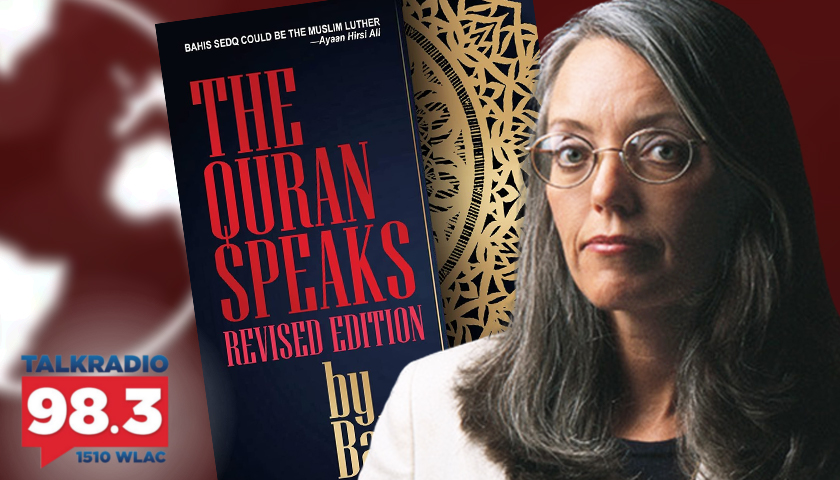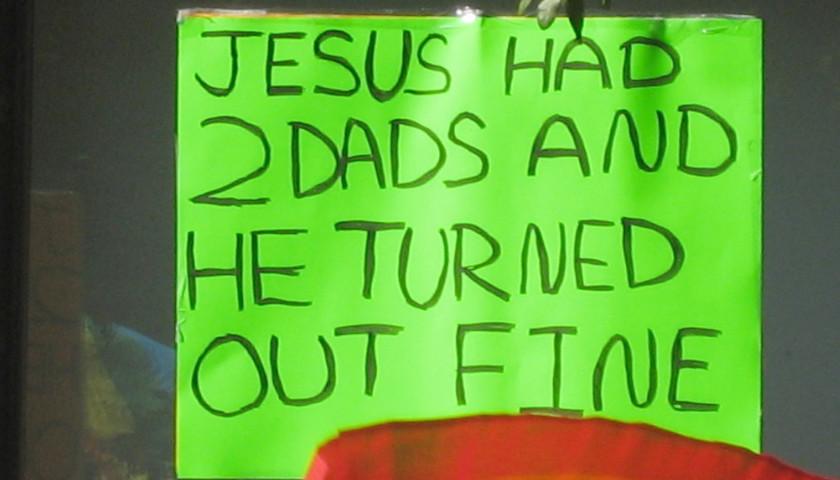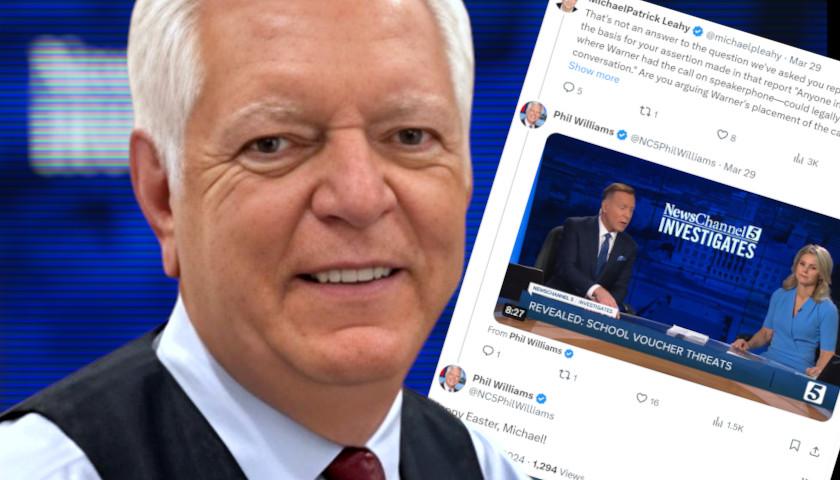Live from Music Row Thursday morning on The Tennessee Star Report with Michael Patrick Leahy – broadcast on Nashville’s Talk Radio 98.3 and 1510 WLAC weekdays from 5:00 a.m. to 8:00 a.m. – host Leahy welcomed editor and publisher Rebecca Bynum of the New English Review in studio to discuss publishing controversy and the new book The Quran Speaks.
Leahy: We are joined in studio by our friend Rebecca Bynum, editor and publisher of the New English Review Press and the New English Review Magazine on the web at newenglishreview.org. Rebecca, you are such a trouble maker you know.
Bynum: I know.
Leahy: You think for yourself you like to publish books for people on controversial topics. But you’ve been doing this now for some time?
Bynum: Yes. We’ve been publishing since 2006.
Leahy: 2006. Newenglishreview.org. How many books have you published?
Bynum: I think it’s 35 or 36 or 37.
Leahy: 35 or 36. That’s a lot.
Bynum: Yes.
Leahy: That’s a lot of work.
Bynum: Yes it is.
Leahy: What kind of books do you look forward to publishing?
Bynum: Oh, I like controversies. I like something that’s interesting to me.
Leahy: So controversial stuff. What’s the most controversial thing that you’ve had so far?
Bynum: Mostly we publish controversial books on Islam.
Leahy: Already you are controversial. Are we allowed to talk about Islam?
Bynum: Of course we are. Of course, we are.
Leahy: I know. But it’s back and forth, generally speaking, anything that is a critical aspect of Islam. It’s called Islamophobia by the mainstream media.
Bynum: Right.
Leahy: And do you get a lot of nice letters from mainstream media outlets saying, thank you so much for publishing this story?
Bynum: No. The mainstream doesn’t want to know us very well. We’re considered far right-wing, so we don’t get into this.
Leahy: If you’re considered far-right-wing and you’ve published 36 books, how are you able to make money? Do people buy these books?
Bynum: Yes. Actually, people do buy these books.
Leahy: How do you sell the books here? And you’re based right here in Nashville, by the way.
Bynum: We are based here in Nashville. We distribute through Ingram, and they’re a wonderful distributor. And they do a wonderful job for us.
And when we started, we were just going right straight through Amazon and then got in with Ingram. And Ingram has been amazingly wonderful.
Leahy: I have self-published some books. And also because I’m interested in the book publishing industry. I’ve self-published in books, and I had one book that was published by a real publisher, Harper Collins. I think we talked about it. I told you. You knew this.
Bynum: Harper Collins. I didn’t know that.
Leahy: It’s way back. It’s 2012, and it was selected by Adam Bello. You probably know Adam Bello a leading publisher who is a conservative publisher and signed a book deal and at least 5,000 people bought the book. (Laughs)
Bynum: That’s wonderful. That’s very good. I don’t think Harper Collins made money on my book. I made money on my book.
Bynum: I think they did.
Leahy: I’ve self-published a number of books before that. That’s 2012. I haven’t written a book since 2012. And the question is, why haven’t you written a book since 2021? A, it’s a lot of work.
Bynum: It’s a lot of work for not a lot of money.
Leahy: There’s the answer. Writing a book. Here’s a clue. I know everybody wants to write a book or everybody thinks they can write a book. Everybody has a thought and an idea and a title, right?
A lot of people do. But there’s such a huge difference between the thought and an idea and a title. What I discovered is it’s a huge amount of work.
Who makes money selling books these days? The big authors, the big, big authors, John Grisham. It is typically mysteries or, I don’t know, dramas. How does non-fiction do in your opinion?
Bynum: Non-fiction does pretty well for us. We mostly do non-fiction. We almost always do. We’ve done a couple of fiction, a couple of short story collections, things like that.
Leahy: I wrote a couple of self-published books. What does Barack Obama believe? What does Sarah Palin believe? This was 2008 and then probably the one people know me most for is Rules for Conservative Radicals, which I wrote back in 2009 and self-published. Of the self-published ones that’s the only one I actually broke even on.
Bynum: Oh, I would have taken that one.
Leahy: Well, again, a time frame. Because what was it taken off of? Well, it was off of the famous Saul Alinksy book Rules for Radicals which he by the way dedicated to…
Bynum: Lucifer.
Leahy: You knew that. Everybody knows that who’s paying attention. Everything we see playing out right now in the Biden maladministration, which to me, is simply an extension of the Obama administration back in 2009. Would you agree with that?
Bynum: Yes. Absolutely. Yes.
Leahy: Everything we see is a game plan from Saul Alinsky’s Rules Radicals. I think marginalizing people. Isolating a target going after them. All the cancel culture. This is all Saul Alinsky stuff.
Bynum: Hillary, I think did her thesis on him, didn’t she?
Leahy: She did do her thesis on him and he offered her a job. She turned him down. Wasn’t that interesting? Tell us about this new book that you have.
Bynum: Our new book is called The Quran Speaks. He’s using a pseudonym, but he’s using a pseudonym. But he’s Sidique which means the truth seeker.
Leahy: So now this is where people were going to say, what? What? What? Tell me the audience of the book is and what the objective of the book is. Tell me the audience and tell me what this book attempts to accomplish.
Bynum: This book is aimed at Muslims. All of our previous books were pretty much aimed toward Westerners talking about Islam. This one is more for Muslims.
Leahy: And let me just interject in the United States today about what two percent of the population is Muslim.
Bynum: Yeah, it’s quite a lot.
Leahy: Quite a bit.
Bynum: Maybe even more than that.
Leahy: Two and a half and growing. And so right now we have roughly 330 million people, so probably six or 7 million Muslims in America. That’s a big market.
Bynum: It’s big. It is.
Leahy: What is the message of this book?
Bynum: He is very gentle and he’s a sweet man. I met him just a week ago. He tries to lead Muslims very gently, very methodically through the Quran, asking them, well, what were you taught about the Quran?
Let’s look at the Quran and see if it’s really supported by the text. So he’s very careful. He’s very methodical. But he leads Muslims to wonder in the end, whether the Quran is actually the word of God or not.
Leahy: Now you just dropped a bomb here when you say that because now everyone is saying now, oh, Islamophobia! (Bynum laughs)
If there is an author who writes a book about the Christian faith and then tries to say tries to bring questions to people about whether or not the Bible is a word of God…
Bynum: That happens all the time.
Leahy: That happens all the time. Those are bestsellers.
Bynum: All the time.
Leahy: That’s part of the although generally speaking, that the approach there is Richard Dawkins in that crowd. They make those arguments against all religions, I think.
Bynum: Yes.
Leahy: Don’t you think so?
Bynum: Yes.
Leahy: So Richard Dawkins would make that argument against Christianity, against Islam, and against Judaism.
Bynum: ‘Ism anything.
Leahy: Because what they’re trying to say is, there is no God. By the way, there is a God. Just in case you’re wondering, there is a God. And do you know where my basic belief on that comes from? It’s called the argument of natural design.
Bynum: Oh, yes. I think that’s really coming back strongly.
Leahy: Let me illustrate what that is. Last night, coming home from dinner, driving through Williamson County, looking off to the west, a beautiful, gorgeous, colorful panorama of a sunset.
I see Scooter agreeing with this. This was no accident. Such great beauty did not happen by itself. It is a consequence of the natural design of God.
And this was an argument William Wilberforce made back in the century. And it is still a very compelling accident. It seems to me.
Bynum: Me too. I agree. Look at a butterfly. Look at a flower. Everything.
Leahy: Look at how intricate that is. It is no accident. And, it is no accident that we are here.
Listen to the second hour here:
– – –
Tune in weekdays from 5:00 – 8:00 a.m. to the Tennessee Star Report with Michael Patrick Leahy on Talk Radio 98.3 FM WLAC 1510. Listen online at iHeart Radio.
Photo “Rebecca Bynum” by Rebecca Bynum.








